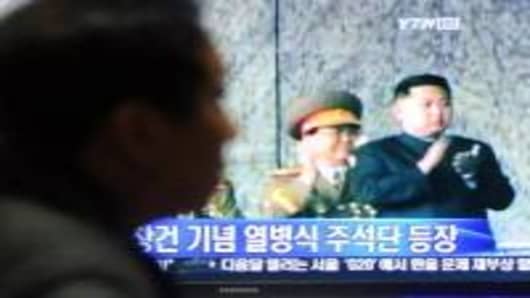When South Korean soldier Kim Kyung-rae heard of North Korea's nuclear test on Tuesday, his first thought was not that war was imminent or that the enemy was closer to a deadly new weapon, but whether the event would interfere with a planned holiday.
Decades of hostile rhetoric and only occasional bellicose action since the end of the 1950-53 Korean War has inured many in the prosperous South to North Korea's growing nuclear threat under its new 30-year old leader Kim Jong-un.
"The first thing that occurred to me when I saw the news was 'What if I cannot get out the base tomorrow?'" said Ki Kyung-rae, a 24-year old conscript, speaking to Reuters on Wednesday.
(Read More: North Korea Crisis: Why China Will Speak Softly)
"Today is the first day of my holidays," he added. "The atmosphere in the base was just as usual. Nothing unusual. I do not think the North will wage a war against us because to me, they are just like a beggar with a knife threatening us for more food."
Kim's nonchalance appears to be shared by many in South Korea. While world leaders reacted with shock and anger to Tuesday's nuclear test, Pyongyang's third and most powerful to date, the top item searched on South Korean Internet portals was a monthly cosmetics sale by local brand Innisfree.
But even outside South Korea, there appears to be a sense that North Korea is inevitably on its way to becoming a nuclear power, and that the world would have to deal with its new young leader Kim Jong-un in that context.
In Japan, often a target for North Korea's harsh rhetoric, there was concern tinged with resignation.
"Oh no, they've actually gone and done it," said Yumiko Kuriyama, a 64-year-old woman in Tokyo, after reading a special edition of a newspaper announcing the test. "They could send one over and hit Japan now. It's scary, it's just so scary."
There was less palpable fear in South Korea, which has lived for decades with 700,000 North Korean troops within striking distance of its capital Seoul, along with 8,000 artillery pieces and 2,000 tanks deployed within 100 km (60 miles) of a demarcation line that splits the Korean peninsula in two.
(Read More: North Korea Threatens 'Stronger' Measures Than Nuclear Test)
The North barely registered as an issue in December's presidential election in the South in a poll that was dominated by concerns over welfare and jobs.
"When I first saw the news, 'I thought this too shall pass.' I met my friends last night for a drink and we did not even discuss the nuclear test," said Josh Lim, a 31-year old businessman in Seoul.
Although the South has prospered while North Korea's economy has languished, the Kim dynasty that has ruled a country of 24 million people since 1948 has remained intact.
More Than a Father's Son
Kim Jong-un was aged just 29 when he became the third of his line to take power in North Korea after the death of his father, Kim Jong-il, who died in December 2011.
His father was over 50 when he took over running the country and his last nuclear test in 2009 was overshadowed by ill-health and persistent speculation the regime would fail to execute a smooth transition of power when he died.
But the son's rule has been remarkably stable, and he appears to have cemented power in the rogue state.
(Read More: Google Earth Puts North Korea's Prison Camps on Map)
It now appears that the youngest Kim will almost certainly achieve his father's dream of creating a nuclear-armed state and the world will have little choice but to come to terms with that. And since he is just 30, it will have to that for quite a while.
"He (Kim Jong-un) is a man we will be dealing with for decades," said Virginie Grzelczyk, an expert on North Korea at Nottingham Trent University in Britain.
That likely means back to diplomacy on North Korea's terms for Washington, Seoul, Tokyo, Moscow and Beijing and an eventual return to six-party nuclear talks that had aimed to bargain away North Korea's weapons program in exchange for food and aid.
Pyongyang wants diplomatic recognition from the United States and cash to support an economy that has been ravaged by famine and mismanagement and to keep the Kim dynasty and its ideology intact.
"As long as Kim Jong-un follows his father's line and does not play the dangerous game of reform... He will certainly remain in power," said Andrei Lankov a professor at Kookmin University in Seoul.
(Read More: North Korea to Target US With Nuclear, Rocket Tests)
"In the long-run, the United States has no choice but to accept North Korea as a nuclear state."


